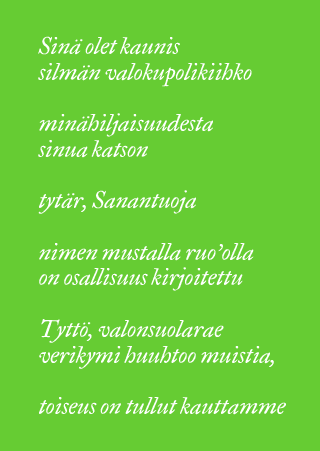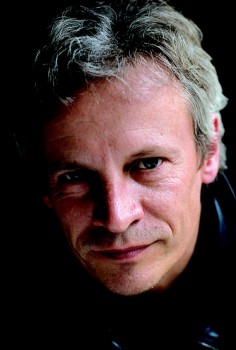Search results for "herbert lomas/www.booksfromfinland.fi/2004/09/no-need-to-go-anywhere"
Like father, like daughter
31 March 1999 | Archives online, Fiction, Prose
Extracts from Tom Tom Tom (Gummerus, 1998). Introduction by Soila Lehtonen
A father and daughter in a hospital back garden
Bits of nail flick to the ground as Kokko cuts Tom’s nails, leaving rather brittle nail-ends among the lichen. In the middle of the hospital afternoon they’ve made their way down to the little park, to care for the hands of both of them, all four.
In the days before Africa Tom used to nurse Kokko on the living-room sofa and cut the nails on her most difficult hand, pushed the cuticles back and taught her the care that ought to be taken of nails, or she’d have smarting and pain round the cuticles. Kokko used to plead to be taken into his nail cutting lap oftener than she should, even when she’d really have preferred to grow longer nails. More…
Blind man’s buff
31 March 2002 | Fiction, Prose
An extract from the novel Laituri matkalla mereen (‘A jetty to the sea’, WSOY, 2001)
Ten steps along the path marked out by the poet
In a gravel pit illegally dug by the sand-king Gropius and later abandoned, the colonel and Henry were shooting at tin cans with pistols. The pit neighboured the Colonel’s home, and he was in the habit of carrying out target practice there with the help of Jovan, to keep his hand in.
The cans were placed at twenty-metre intervals in front of a sandbank and were raised on coil springs, so they swayed freely in the air. Each of them was attached to a long line; this, when pulled, swayed the cans, rattling stones inside them. Following the sound, the colonel identified the can’s position, aimed and fired. The hits he heard himself, the misses usually struck the pieces of hardboard behind the cans. These were divided up dartboard-fashion into sectors and rings, and Jovan used binoculars to spot the hits on them and announce the points of impact as clock-numbers and distances from the can’s central position, enabling the colonel to correct his aim. This he did with the aid of a rake. He held the rake upright, prongs downwards, so that its handle stood roughly perpendicular to the ground. Moving the handle sideways with careful estimation, and sliding his pistol hand up or down on the handle, he was able to make corrections with reasonable accuracy and determine his aim. More…
Goodbye darling
30 March 2005 | Fiction, poetry
Poems from Niin kovaa se tuuli löi (‘So bitterly the wind struck’, Tammi, 2004)
Lord, you've promised to come, don't hang back.
Here we are already, sitting, me and the dogs,
and the others that have to go.
Jesus, poor thing, didn't know whom to bloom for,
just kept on lugging his cross, pretty as a pony.
He came and shot us down,
bullets flying without his even noticing.
The night was gifted with roses
full of love.
Through a woman we came here, through a man
we leave.
A greater solitude
30 December 2004 | Fiction, Prose
Extracts from the novel Runoilijan talossa (‘In the house of the poet’, Tammi, 2004)
Images of love
The double door to the patio is tightly swollen into the framework, so tight I’m chary of using force to prize it open. The windows might break. The lower part remains stuck, as if screwed to a carpenter’s bench, while the upper part gapes – leans out as if longing to liberate itself from its lintel. That’s an image of love: one part longs to be free, the other part holds on fast. I get a toolbox from the cleaning cupboard and try to hammer a chisel into the space between the bottom edge and the threshold. I succeed, but the chisel marks the door, defacing it. That’s an image of love too. More…
Where we are now
30 December 2004 | Fiction, poetry
Poems from Taivaan mittakaava (‘The scale of the sky’, Otava, 2004)
Architect
Behind your back the city’s changing,
across the sky a crane’s swinging
ready-made components.
A tie splits the architect’s white shirt,
his paired limbs and individual organs,
two lanes, left and right.
You and I are precisely planned.
Even now we’re on a ruler’s edge. More…
Renaissance man
30 September 1990 | Archives online, Fiction, Prose
An extract from the novel Bruno (WSOY, 1990)
Since her first collection of poems, which appeared in 1975, Tiina Kaila (born 1951 [from 2004, Tiina Krohn]) has published four children’s books and three volumes of poetry. Her novel Bruno is a fictive narrative about the Italian philosopher Giordano Bruno, who was burned at the stake in 1600. It is the conflict inherent in her main character that interests Kaila: his philosophical and scientific thought is much closer to that of the present day than, for example, that of Copernicus, and it is this that led him to the stake; and yet he did never abandon his fascination for magic.
The novel follows Bruno on his journeys in Italy; France, Germany and England, where he is accompanied by the French ambassador, Michel de Castelnau. Bruno finds England a barbaric place: ‘…These people believe that it is enough that they know how to speak English, even though no one outside this little island understands a word. No civilised language is spoken here’
In the extract that follows, Bruno, approaching the chalk cliffs of Dover by sea, makes what he feels to be a great discovery: ‘Creation is as infinite as God. And life is the supremest, the vastest and the most inconceivable of all.’
![]()
I was leaning on the foredeck handrail, peering into a greenish mist. The bow was thrashing between great swells, blustering and hissing and shuddering like some huge wheezing animal: Augh – aagh – ho-haugh! Augh – aagh – ho-haugh!
Plenty of space had been reserved for our use on this new two-master cargo boat. Castelnau was transferring his whole family from France – his wife, his daughter, his servants, his library, his furniture, his past and me – to London, where, as you know, he had been appointed Ambassador of France. More…
Say what you like
30 March 2007 | Fiction, poetry
Poems from Sanomattomia lehtiä and Leikitään kotia (‘Newsless newssheets’, ‘Let’s play house’, Tammi, 2004 and 2005)
Scent of morning
Say what you like about life, but life’s nothing that’s been said. The sun sets in a sepia setting where together a man and a woman walk out of the picture. At the start of the romantic’s story candles are lit, the girl stoops to hear better. Lonely stones roll from the horizon’s laughter, farewell to the continuity we love. Just for a second you could see from his face what he’d look like in twenty years. More…
What the snail thought
30 September 2005 | Fiction, Prose
Poems from Tapahtui Tiitiäisen maassa
(‘It happened in Tumpkin land’, WSOY, 2004)
Illustrations by Christel Rönns

Meritähti
Eli merenpohjassa Meritähti
tuhat tonnia vettä yllä.
- Minä jaksan kyllä,
sanoi Meritähti.
- On terävät sakarat,
ja litteät pakarat
ja paineenkestävät kakarat!
Arska
30 September 1982 | Archives online, Fiction, Prose
A short story from Kaksin (‘Two together’). Introduction by Pekka Tarkka
A landlady is a landlady, and cannot be expected – particularly if she is a widow and by now a rather battered one – to possess an inexhaustible supply of human kindness. Thus when Irja’s landlady went to the little room behind the kitchen at nine o’clock on a warm September morning, and found her tenant still asleep under a mound of bedclothes, she uttered a groan of exasperation.
“What you do here this hour of day?” she asked, in a despairing tone. “You don’t going to work?”
Irja heaved and clawed at the blankets until at last her head emerged from under them.
“No,” she replied, after the landlady had repeated the question.
“You gone and left your job again?”
“Yep.” More…
Sound and meaning
20 January 2012 | Essays, Non-fiction

Harri Nordell’s poem from Huuto ja syntyvä puu (‘Scream and tree being born’, 1996)
Translating poetry is natural, claims Tarja Roinila; it is a continuation of writing it, for works of poetry are not finished, self-sufficient products. But is the translator the servant of the meaning – or of the letter?
I am sitting in a cafe in Mexico City, trying to explain in Spanish what valokupolikiihko, ‘light-cupola-ecstasy’, means. And silmän valokupolikiihko, ‘the light-cupola-ecstasy of the eye’.
I take to praising the boundless ability of the Finnish language to form compound words, to weld pieces together without finalising the relationships between them, never mind establishing a hierarchy: the eye is a light-cupola, the eye is ecstatic about light-cupolas, light creates cupolas, the cupola lets out the light, the eye, in its ecstasy, creates a light-cupola. More…
The Comb
30 September 1981 | Archives online, Fiction, Prose
A short story from Tilanteita (‘Situations’, 1962). Introduction by Vesa Karonen
The young man’s comb dropped behind the radiator under the window. The young man crouched down to look and felt with his fingers in between the pipes and along the floor. No trace of the comb.
Lose something on a train and it eludes you. A train ticket I left once – just placed it long enough on the window ledge for it, too, to fall behind the radiator. Couldn’t find it. The conductor came along, said “Any new fares! Tickets please.” I just sat still, totally unconcerned, until he’d gone. I’m sure there are little details which give the game away to conductors, they know who’s just got on.
New passengers are always somehow fresher, more alert. In winter, I hear, they look at the passengers’ feet. If there’s snow round the edges of the shoes, no need to hesitate. A lot of people are done for by looking straight in their eyes. Offenders always look straight back and then in the middle try to look somewhere else entirely. I was careful not to look steadily into the conductor’s eyes. It was easy when I concentrated on the way the long ventilator cords swung back and forth from the ceiling. They all swung in the same direction but some cords were a bit behind the others. Perhaps it was because the cords were all slightly different in weight and length. Now I remember – it’s not the weight that counts, just as it’s not weight that affects the way a pendulum swings. When the conductor had gone I began to look for my ticket again. I went on looking for it all the way to Tampere. The young man, too, would obviously go on looking for his comb until he got where he was going, without finding it. More…




